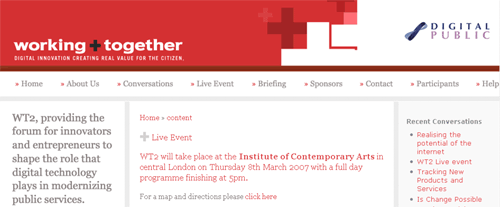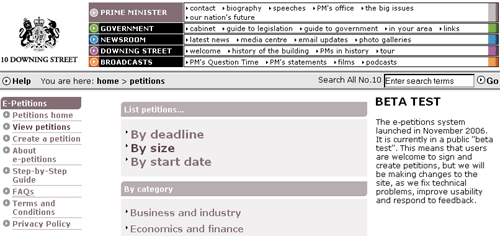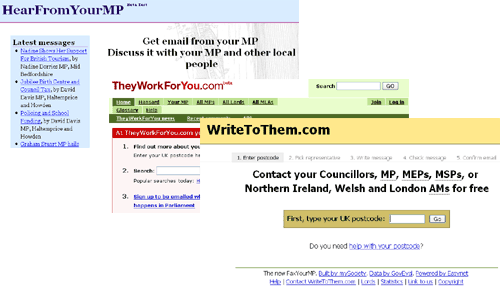Working Together - lessons from the road-pricing petition for eGovernment
Next month sees what could be an interesting one-day event in London called "Working Together 2" - which I would have attended if my next flight into the UK didn't miss it by one day.
The conference is looking at ways that the public and private new media sectors can combine together better to deliver value for people in the UK from new media solutions.

(Although I see from Dave that the organisers could do with a little new media help with their bulk email solution)
Part of the aim of the day is to find ways that government and local authorities can break technology requirements into smaller chunks, that can be more easily bid for by smaller UK based companies. This would be better for the British economy than everything seeming to end up as monolithic projects that only large international tech firms can bid for. These kind of projects frequently cause commentators like Wat Tyler to seethe at the level of taxpayers money being expended on them and I know, from having met several new media people from within civil service departments at conferences, that there is often a real appetite there to be more flexible and agile with technology deployments.
Next month's WT2 event features George Osborne, the Shadow Chancellor, talking on the impact of social media on public services.
The timing of that topic is very interesting, since one of the few examples of big government using small and agile new media development to reach out to people - the Ten Downing Street e-petition site developed with MySociety - has been in the news over the last couple of weeks.

The fact that nearly two million people have signed up to express an opinion on a single policy proposal has been widely described as "a PR disaster" in the media.
Interestingly, the media themselves have been helping to fuel it. According to Heather Hopkins at Hitwise UK:
the e-Petitions website was the top website visited after [visiting] www.dailymail.co.uk last week.
and
The Daily Mail was the fourth largest provider of traffic to the e-Petitions website behind Google UK, MSN Hotmail and the No. 10 Downing Street website.
Personally I'm with Benjamin Wegg-Prosser on this one rather than the shamefully un-named minister who briefed against him as a 'prat' for getting the site set up.
Driven by the rush to sign the road-pricing petition, the e-Petition site has become the UK government's number one web destination. It is one of few, if not the only, government website to have been launched as an ongoing 'beta', and was done for a fraction of the cost that other departments spend on their sites. The work MySociety have done on the site shows exactly the kind of impact you can make in the online public service space using social media.
I'm hoping, in my absence, that somebody else on the WT2 day will be questioning George Osbourne on what he thinks about the petition site, and about other internet tools enabling political engagement via the web in the UK like WriteToThem, TheyWorkForYou (now successfully exported to New Zealand) and HearFromYourMP.

Martin, great post. I agree that the bulk email solution wasn't great - but at least there was a response. Would be great to see a place where consumers could discuss these issues with one another - a conversation. The trouble I see with the bulk email is that whilst it is a start, it is a one way communication.
However, hosting a more web 2.0 discussion might be done better by someone not from government!
Best, Heather